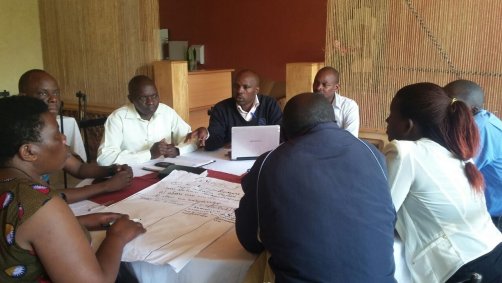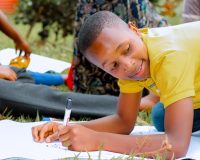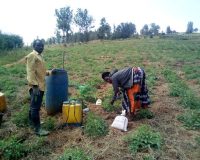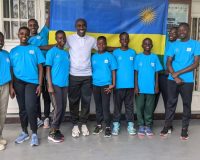On Friday June 3, 2016 a joint meeting took place in Rubavu, gathering together all the stakeholders in education sector focusing on school dropout issue. 9 Sector Education Officers and 3 delegates, the representative of the District Education Officer, children’s care institutions and organizations operating in Rubavu district such as NCC, UYISENGA NI IMANZI, Vision jeunesse nouvelle, Right to play, Point d’ Ecoute, Organization des Jeunes Pacificateurs,etc.
tc.

The meeting was chaired by Mr Bigaya in charge of Gender and Child development at district level, welcoming all participants from public sector and NGO’s to this strategic action on fighting the school dropout and inviting UYISENGA NI IMANZI to share its best practice.
Taking the flow, Uyisenga ni Imanzi Country Director, Chaste Uwihoreye, explained the model to Rubavu partners, sharing experiences from 3 other districts in which anti drop out campaigns took place ( Kamonyi, Nyanza and Rwamagana), means and strategies used so far.

Various stakeholders in education and children’s care who attended the meeting (SEOs, representatives of NGOs working with children and / or in the education sector, etc) have pledged to support the district to achieve its objective, in bringing back students and pupils to school and in providing necessary support.
The model he presented is as follow:
On the first stage: A need assessment was done in these 3 districts and has shown many challenges encountered by children or their parents or carers and causing school dropout (mindset, poverty, poor school environment, school feeding fees, school materials and the carelessness of people in charge of children’s education at large).
On the second level : Means used to reintegrate children in schools have been essentially found at community/family level through child protection structures efforts (collaboration between child protection structures, local and schools authorities. This model is built on child protection networks (composed of local leaders, school representatives and UNM on one hand as mobilizers), and parents whom children had dropped out of schools with parents/ children’s structures on the other hand.
On the third level: the implementation of the model (school reintegration) together with regular follow up and evaluation with strong appeal on community ownership.
UNM country director on the anti-dropout initiative and up- coming campaign in RUBAVU
![]() A child is a long term investment
A child is a long term investment
![]() Caring for children is a best way to eradicate poverty
Caring for children is a best way to eradicate poverty
What is needed?
Joint work but much success in fighting School Dropout: Advocacy, advice, sensitizing parents on the child wellbeing, child protection, education for all, etc.
After an open discussion, participants have formed group discussions for exchange on strategies to adopt for succeeding the school reintegration process around 2 themes:
1) What should be done to allow children who had dropped out of school to be reintegrated?
2) What should be done to ensure that children that have been reintegrated are kept attending school?

After group works, a plenary session took place to adopt the recommendations, to share roles and responsibilities and to agree on time frame as follow :
1. Listing all the children who are not attending schools living in their families by SEO before 06/10/2016
2. Listing all the children who are not attending schools in streets by two Organizations : Point d’écoute &Organisation des jeunes pacificateurs before 06/10/2016
3. Training for all stakeholders in education and children’s care from all the 12 sectors by UYISENGA NI IMANZI on 06/14/2016
4. Mobilization of parents, teachers, children and local leaders on school reintegration in all 12 sectors by the District, UNM & JADF on 06/16/2016
5. Mobilization events at sectors’ hotspots centers by Local Partners on 06/21/2016
6. Counselling and psychosocial support sessions by Local Partners
7. Penalty measures for parents who do not send their children at school by District
Special recommendations
• Finding foster care families for children in streets (the activity will be planned after the mobilization events).
• Adapting schools into a welcoming, friendly and safe place. For instance after considering the reintegration process, not only avail needed materials such as classes, desks, books, recreational equipment, etc. But also looking at the number of teachers to ensure the best quality education to all children (to be planned after the mobilization events).






